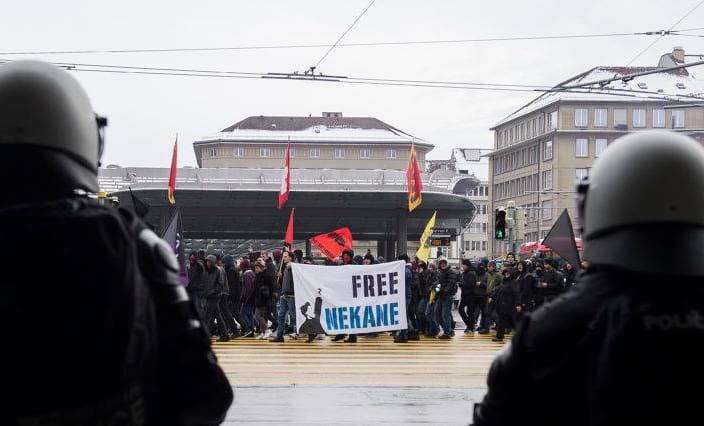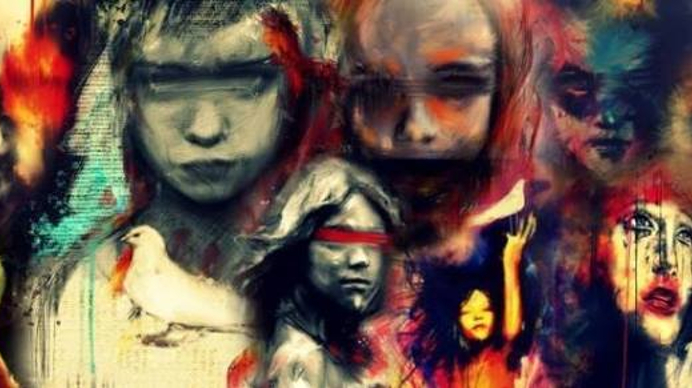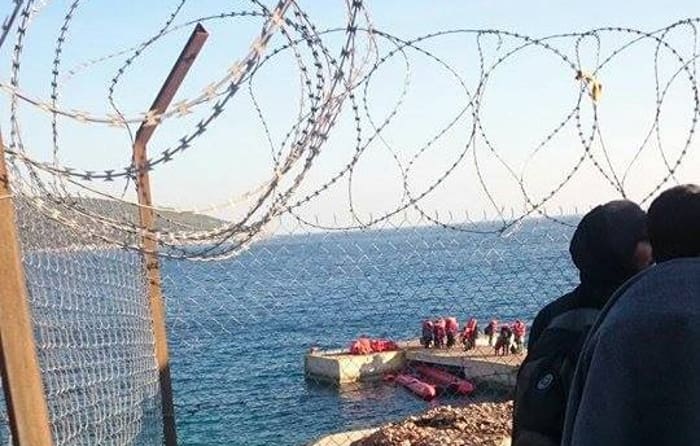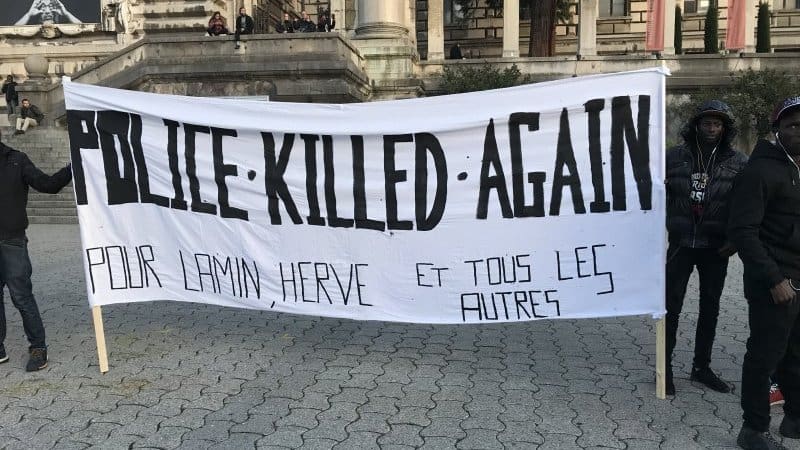AntiNote: the Swiss “magazine for autonomous journalism” ajour has recently established a correspondence with Basque liberation movement activist Nekane Txapartegi, who has been imprisoned nearly incommunicado in Switzerland for over a year and is facing extradition back into the hands of the Spanish authorities she fled a decade ago.
Nekane writes from prison in Spanish, and ajour has been presenting her letters in German for their local audience (there is a movement building rapidly around her and her cause); this is a translation from the German. The second letter obtained by ajour was just published today and will appear here shortly.
Free Nekane! Free all prisoners!
Prison Letters I: The Globalization of Fascist Thinking
by Nekane Txapartegi for ajour magazin
13 July 2017 (original post in German)
Out of sheer enthusiasm for stamping out political dissent and coercing the spread of his own authoritarian way of thinking, Turkish president Erdoğan has locked up and tortured hundreds of journalists and shut down numerous media outlets. Unfortunately, this Sultan is not the only one with enthusiasm for such practices. The same measures are being undertaken by Franco’s heirs in the [governing] Partido Popular against the Basque people, and have been for decades. In a well-orchestrated plan, they declared a so-called “low-intensity conflict” and with strategies like the Corcuera Lawi and Plan ZENii (the slogan for which was “A well-told lie is worth more than a thousand truths”), they have tried to forcefully impose their way of thinking on everyone.
With the same aim, the closures of the newspapers Gara and Egunkaria followed later on. And it wasn’t enough to simply shut down the only newspapers available in the Basque language, but their director was abducted and brutally tortured. This fact was recognized by the European Court of Human Rights in Strasburg years later.
After having myself already suffered brutal torture and nine months disappeared within Spain’s prisons of extermination, I experienced renewed persecution starting again in 2000. This time it was for my activities as a journalist at the investigative magazine Ardi Beltza.iii Because of a few articles that had caused the hegemonic parties some discomfort, I had to testify in court on several occasions. At the same time, various sorts of police harassment were aimed at making our work as journalists impossible. But since we didn’t flinch at their threats and continued to voice our social and political grievances, the magazine was outlawed under an order by the exceptional high court of Spain (Audiencia Nacional) and shut down. Years later the same court cleared the magazine of its alleged crimes, but the damage had already been done.
All of these attacks were a continuation of an aim the heirs of fascism have long held and still hold: to compel an entire population to its way of thought and its historical memory. To do this they had to wipe all dissidents off the map. That’s what the Exception Laws were for: the Audiencia Nacional had turned itself into a political weapon in the hands of the fascists.
Now that we have arrived in the 21st century and the specter of armed conflict has receded (the ETA unilaterally disarmed last April), the laws have simply changed their names. But they are still the laws of a state of exception, and they still have the same consequences for dissidents: persecution, criminalization, repression, and imprisonment. Freedom of expression exists only for those who think the way they do. The Ley Mordaza (Muzzle Law) is used against dissidents to assess high fines and even jail time. Any reference to the Basque conflict is penalized; it gets qualified as apologia for terrorism and is often punished with prison, such as in the example of Madrid’s outlaw puppeteers: a number of marionette artists were locked up in 2016 for having produced a parody of the ETA at a children’s theater.
In Basque or Catalan mouths, words become crimes. For Basque and Catalan people, there is no freedom of expression, only the risk of being outlawed, because everything is apologia for terrorism. For example, when an anti-capitalist Catalan spoke the sentence, “You have to break eggs to make a tortilla,” it was interpreted as a defense of terrorism and an incitement to violence—this person is facing prison time. Twitter is also not free of this kind of demented repression: there have been arrests of Twitter users through a shadow law enforcement operation called Araña. They get tracked down, hauled in front of a judge, threatened, and punished with fines or imprisonment.
Even though Amnesty International has recently denounced Spain for achieving no political normalization and violating basic rights in the name of “fighting terrorism,” the entire political class still squeezes their eyes, ears, and mouths shut. Reporters Without Borders places the Spanish state at number 29 on its blacklist. The European Federation of Journalists has challenged Spain’s Muzzle Law before the European Council—though these challenges are all destined for the dustbin given the deep complicity of European elites as the rearguard for the Spanish and Turkish Kingdoms of Coercion.
In spite of all that, the “neutral” governors of Switzerland have decided to deport me. In all their public statements, they have tried (in quite a Spanish way, frankly) to conceal and deny any political persecution or torture. They have gone to great lengths to present the Spanish state as democratic. But I wonder if I missed this chapter of democratization in Spain, because I still live in the continuity of the fascist regime. The fascist court simply changed its name, from Tribunal de Orden Público (Court of Public Order) to Audiencia Nacional (National Inquiry). Inspectors from the Francoist police like Ismael Moreno themselves became judges. The paramilitary police (Guardia Civil) is still the same. The systematic torture in the dungeons of police stations goes on to this day; there are still political show trials; judgments are brought down on the basis of evidence obtained through torture; the torturers themselves have complete impunity; policies of extermination and dispersal are being used; sentiments of vengeance and hatred against deathly ill Basque political prisoners run rampant. The Spanish police has pursued me, illegally, here in Switzerland.
Where is the dividing line between these two lies that call themselves democracy and dictatorship? The fact that they haven’t shot me? Draw your own conclusions.
Note from ajour magazin on their series “Prison Letters”:
“I gladly accept your proposal, and I’ll send you a couple articles right away—mail here is subject to the whims of the warden, so everything takes a long time.” This was our imprisoned comrade Nekane Txapartegi’s answer in a letter, after we asked her whether she would write a column for ajour magazin now and then. The chance for prisoners to put words on paper, and especially then to transmit these words to the outside, is systematically impeded—Nekane was in custody for a year before she finally achieved access to a computer. Printing out a text is then also a difficult bureaucratic process, a “bureaucracy of absurdity, to strip us of all autonomy,” as Nekane puts it. Thus it pleases us all the more to be able to publish this first translated article by our Basque friend, the revolutionary feminist, activist, and journalist Nekane Txapartegi. Use mit de Gfangene! [Free All Prisoners!]

Nekane Txapartegi is a former city council member and a journalist for the leftwing Basque liberation movement. After being imprisoned and tortured, she went underground in Switzerland. She has been sitting in a Zurich deportation detention facility since April 2016.
Translated by Antidote
Featured image: Bern, January 2017. Source: Freiheit für Nekane (Facebook)
* * *
i The Corcuera Law, named after the socialist minister of interior at the time of its passing, came into force in 1992. It stipulated, among other things, that police could now enter people’s homes without a court order. Even though this article was declared unconstitutional by the constitutional court, the law stayed in force until 2015, when it was replaced by the so-called Muzzle Law.
ii Zona Especial Norte (ZEN), the “Northern Zone of Exception,” is the government’s term for Basque country. Plan ZEN was developed in 1983, shortly following the PSOE (the socialists) taking power. It was a comprehensive strategy to wipe out the Basque liberation movement. The plan included elements of psychological warfare and counterinsurgency, the formation of death squads (Grupas Antiterroristas de Liberación, or GAL), and the launching of a massive disinformation and media-influencing campaign.
iii Ardi Beltza (Engl.: Black Sheep) was a monthly magazine founded in 1999. Its makers had earlier put out the newspaper Egin, but it had gotten banned. By 2001 Ardi Beltza had already been driven to financial ruin, and had to dissolve. In advance of this had come various repressions, such as the imprisonment of one of its chief editors for alleged membership in the ETA.






Pingback: aNtiDoTe Zine: prison letter #1 in english | Free Nekane
Pingback: Iñaki and Me | aNtiDoTe Zine